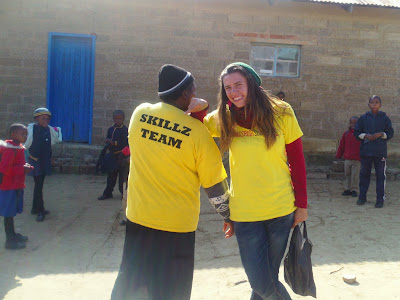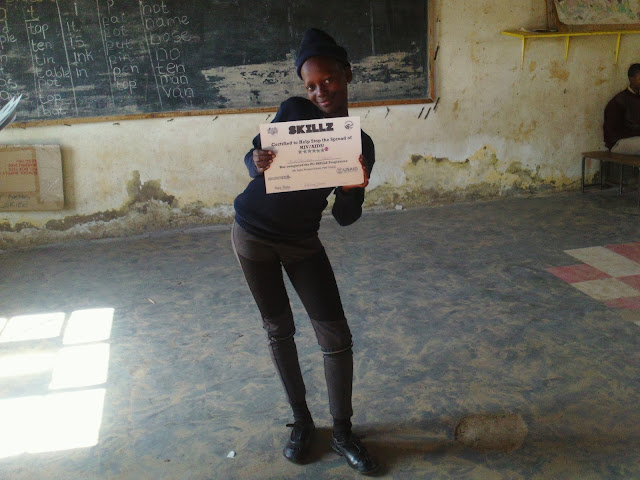And here is where I try to write about the
big stuff. The vastness of this experience and the way it's changed me. The way
it forces me, every day, to reconsider, to pause, to breathe, to grow.
It's relatively easy to write about the pieces of my life in Lesotho. The teaching or the students or the host family or the bucket bathing. The animals and the other volunteers.
 |
| the moon to my sun, the fred to my carrie |
The calm that
settles over everything in the early morning and the way the star-studded sky
in its all-encompassing glory reminds me of my insignificance each night.
It's much harder to try to explain what all of this means to me. But I'm going to try, mostly in a vain attempt to prepare myself for the inevitable “so how was Africa?!” when I return. I need to write this so I can feel like I tried to get the it across.
I don't really know where to start. Almost twenty months ago I stepped off a plane with a bunch of other jet-lagged and wide-eyed Americans into what was then an utterly foreign place, and now this place is my home. What happened between that moment and this one? When did the this, the it that I'm struggling to describe, really begin? Was it the first time I really understood what someone was saying to me in Sesotho? Was it my first day in village? My first day of teaching? Or was it that windy, dusty day that took me from the airport in Maseru to a village of singing bo-me (women) and finally to sleep in a bed that would be mine for the next three months?
The answer is none of them, and all of them.
Firsts are easy to point out when we look back on an experience, but the
reality is that the it happened, as cliché as it sounds, when I was just living
my life.
At
some point after I moved to my village I got very invested, by necessity, in
the act of self-care. I asked myself directly, as in a conversation with a
lover, “What do I need to be happy?” And the answer came back, “you, you need
you. You are all you have.” So, I got very into me. I settled into routines
that made me feel good and got very in touch with the inner thought processes
and dialogues that permeate my mind.
I made a practice of reminding myself, every
day, that happiness is a choice. That there's nothing inherent about Lesotho
that makes a person unhappy, because Basotho are some of the most joyful people
I've ever met and their lives are way harder than mine will ever be. That I can
actively choose to focus on gratitude, no matter where in the world I am, and
to be light and playful and spontaneous and open-hearted in the way I live.
Some time later, I began to get really used to things here. I began to let go. I started to move slower and have a looser sense of time. I stopped trying to make logical sense out of life, because there's often no real reason for a lot of things here that would make a difference to know.
Certain things like animal rights and consciousness about the environment became non issues in my mind, as they are for Basotho. I got really comfortable with my students and teachers.
I don't know when I began to constantly see myself through the eyes of the people around me, but that sort of vision is second nature now. I became so used to being stared at that I don't even notice it happening half the time anymore. I got really invested in the people I live and work with.
I got used to the unconscious tuning out that my mind does of the fast Sesotho being spoken around me. I learned to choose my battles.
And at some point, I stopped counting down the months and just settled in to existing. Before I knew it, I was home.
That process was hard, no doubt about it. The peace corps is hard. To forever be the outsider without the (linguistic, cultural, fill-in-the-blank) no-how in a place so far from home is lonely. There are things about Lesotho that I'm not a fan of. There were days and there still are days when I just want to scream, to curl up in bed, to cry. I've done all of those things a lot.
But for me, those low points never cancelled out the goodness of Lesotho. I get to live in a place where a breathtaking sunset is an every day occurrence,
where people sing freely and spontaneously
pretty much anywhere. Where hilarious and quirky moments that are integral to
the culture here happen on a regular basis, like being accompanied on my walk
home from school one day by a large group of my teenage boy students, wrapped
in blankets and swirling sticks above their heads, scooting together in a
huddle to the rhythm of the deep throated melody they were harmonizing.
Where
people really take the time to take care of each other above all else. People
have gone so far out of their way for me, and I know I won't leave behind
anything close to what I'll take when I go. It's not right.
Throughout all of this, I've always known there would be an end date. That as much as I love Lesotho, there really isn't a future for me here beyond these two years. Sometimes I miss my people in America so much it's like I can literally feel my heartstrings being pulled, and I'll be so happy to see them again. And lets be real-washing machines are dope.
The difference now is that the end is in
sight, whereas before it was some far off eventuality that didn't really affect
me.
I'm beginning to imagine what it'll be like to leave all of this behind, all the while with the sinking feeling that home won't feel quite as much like home as it did when I left. Not because of America, but because of me.
I'm not the same person I was on that dusty day in 2014 when I stepped off the plane, and a piece of my heart will remain here when I go.
But for now, I'm soaking up each moment I have left. It's all I have, and all I can do.
And for those who were wondering, the plan is to be back in Philly in time for Christmas.
Khotso and much love.
And here are a couple of my favs from funny day, where kids take the dress-up opportunity to dress like their parents and shave their heads.













